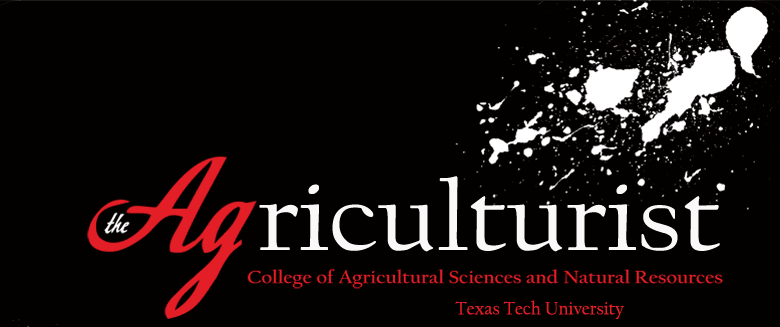
Table of Contents
Features
Agriculture: We Can Sustain It
Socializing Agriculture
Painter of Quiet Places
An Apple a Day
Sustaining the Four Sixes
Hitting Pay Dirt
The New Face of Agriculture
The Winds of Change
Avatars Animate Agriculture
Professors in Training
Going Green
Saving Lives One Plan at a Time
Protecting Our Food
Quality Cells, Consumer Buys
Tech's New Mate
Micro ZAP
Food Saftey in Mexico
Expanding Opportunities
No Bits About It
The Family Farm Fire Man
Around the World with CASNR
Live From Texas Tech
Looking Forward
Getting Schooled
A Cotton Senstaion
Living and Learning
More Than a Trophy
Online Exclusives
Alumni Lance Barnett: Unpeeled
Agricultural Education and CommunicationDepartment Shines in 2010
CSI: Classroom Soil Investigation
Facing Nature
GINuine
Healing Hooves
Parking and Partying in Style
Raider Red Meats
Standing TALL
Tech Takes Flight
West Texas Cotton Goes Global
Around the World With CASNR
By Michelle Newton
The College of Agricultural Sciences and Natural Resources provides six different opportunities for students to study abroad.
For many, international study can change a student’s outlook on life. Bailey Eiland, a junior agricultural communications major from El Paso, Texas, studied abroad in Brazil for six months.
“The things I experienced and learned over the six months I was abroad were probably more valuable than most of the things I have done in my life,” Eiland said.
At the beginning of her trip, Eiland took an intensive language class in Sao Paulo and became fluent in Portuguese. Eiland said she spent close to three weeks traveling and relaxing on the beaches of Brazil before she began her studies at the Uniersidade Federal do Rio Grande do Sul.
Eiland was able to witness many things in Brazil that a person does not see every day in the United States. One of the biggest things she said she was taken aback by was the extreme poverty levels of so many citizens.
“Living a sheltered American life had not prepared me for the horror and destitution in these neighborhoods,” Eiland said.
Although she witnessed some dangerous happenings in Brazil, Eiland stressed the fact that studying abroad is important and it was well worth the experience. She thinks every student should take the opportunity before graduation.
“While studying abroad, students will open windows of opportunity, will network on an international level, and set themselves apart from the mainstream pack,” Eiland said.
Norman Hopper, executive associate dean for academic and student affairs, said students gain valuable skills that cannot be attained elsewhere.
“Studying abroad gives students a perspective on how other people live,” Hopper said.
Hopper, who travels internationally often and leads the China trip, said students in today’s society do not understand how people in foreign countries actually live.
In China, students have the opportunity to study a variety of agricultural topics. Students visit farms where they learn about crop and livestock production as well as agribusiness.
In each experience, students learn first-hand the culture of the country as well as its agricultural industry. During their 15-day China trip, students have the opportunity to visit the Great Wall, the Forbidden City and the Temple of Heaven along with other popular venues in China.
Hopper said studying abroad not only provides an educational experience, but a cultural experience as well.
“It gives a broader perspective of international travel and trade,” Hopper said, “and provides tremendous interactions with the local people, and makes students more marketable.”